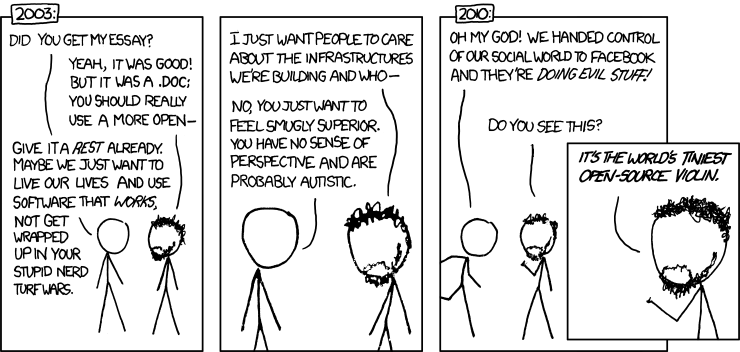A central authority will control every aspect possible.or
As much as possible will be made available in its entirety for public inspection and involvement.With that in mind consider this: are you more willing to use Apple or Linux computers? I know, I know "It just works." "I'm not a 'techie,' and don't want to have to deal with all that complicated stuff" "The way the little book opens is just so cute." I've heard it all before. I recognize that Apple has abstracted more of the functions for the user and produced very powerful, stable, efficient (though you wouldn't know if from their pricing) technology solutions, but you're missing the point. I don't want to talk about Apple per se. I want to talk about the choices we make, especially in technology.
Our choice in technology tends to be surprisingly shallow when we consider the depth of the effect technology has on us. We decide based on what looks nice, has the coolest features, or sometimes (usually if we're a little more informed) runs well and has the most processing power. For something that is so rapidly changing the way we interact, work, and quite arguably think this seems like pretty arbitrary criteria. Will it cause me to seek large amounts of less intimate relationships more efficiently? Will I ponder issues less in favor of looking up a quick and easy answer from a third party source in the most sleek and stylish way? These are the kind of questions we're asking, when we could be asking ourselves questions like, "Will I be engaging in and contributing to a infrastructure that promotes openness and individual freedom?"
If I may be candid for a moment let me admit my smug tech nerd ways. I used to be a little annoyed, mostly due to the immaturity one has early in life that others know different things than you do, when people didn't know how a computer's file system worked, the difference between a program and a text file, or why they couldn't get on the internet. I'm quickly becoming less annoyed by these people, but that annoyance is being replaced by fear.
I'm afraid because I know that market forces drive technology, and it's terrifying to see the market choose flashy, easy, and restrictive items over empowering items that might make them work a little harder. I'm afraid because working in tech support I've seen just how helpless people are when their technology breaks, how helpless many people are when it comes to fixing their technological problems, and how earnestly industry is working to make sure that problems may come up less at the expense of being fixable without being invited into a company's inner circle to error codes and access controls. I worry about living in a world where a relatively small conglomerate of programmers, advertisers, and businessmen are making sweeping decisions on how people live their lives, and the people are relatively powerless to and even uninterested in changing that.
Many are afraid of the effect technology is having on the human psyche and sociological structures. It's easy to blame the technology for this, but I feel that's misguided. If our minds or societies are becoming corrupted it's not thanks to the internet, smartphones, or video games. It's because we're using these poorly. And why wouldn't we if most of us don't know how they work at all, and only know what they do as the company making it presents that to us?
Studying mathematics and physics where most modern research is done with the aid of computers I'm perhaps blessed to have been taught in a tradition that specifically points out where computers are helpful and where our own intellect should be applied. Questions of what's computable and what isn't are addressed directly, as well as questions of the best way to compute that which we would indeed like to compute.
I worry a lot about my tone here. As I recently found out when reading a book on obesity, it's sadly easy to dismiss those presenting information and ideas about something as, "Oh, they're one of those type of people. That explains why they would say that." It would be so easy to end up being that "smugly superior" guy who'll criticize folk for having different views on technology or not knowing as much as he does about computers. As the comic below illustrates thouygh, sooner or later we'll be uncomfortable with how the technology we use works, and if unless we develop the appropriate infrastructure we'll be unable to change it.

No comments:
Post a Comment